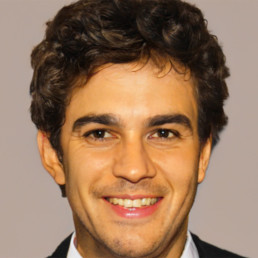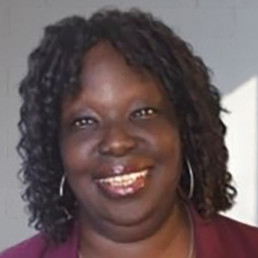Redefining representation in engineering careers

Written by Virtue Igbokwuwe
Virtue Igbokwuwe is a civil engineering graduate from the University of Southampton, currently working at Eurovia. She recently took part in Tomorrow’s Engineers Week - an annual celebration run by EngineeringUK. Her YouTube channel, The Virtuous Life, has over 5,000 subscribers.
Looking back, I can recall the exact moment I heard the words ‘civil engineer’. I was having a conversation with my A-level physics teacher about an essay she had set. She told me about the profession and the wider engineering sector. She opened my eyes to a fascinating new world full of brilliant opportunities. I wouldn’t be where I am today without her advice and guidance. I’ve made it my mission to encourage more girls to follow in my footsteps and hope that you can help. So, I’d like to tell my own personal story of how I became a civil engineer.
Before starting at the University of Southampton, I remember desperately searching ‘civil engineering student’ on Google and YouTube. I was desperately trying to find someone like me studying the course or in the industry. I remember seeing a lot of aspiring Lawyers and Doctors on YouTube but not a lot Engineers, especially Civil Engineers.
Ask anyone what an engineer is, and they will inevitably paint a picture of a middle-aged man with a clipboard wearing a hard hat. Since entering the field, I have learned that the narrative around engineering being male dominated is so outdated. It really couldn’t be further from the truth. In fact, my cohort split at university was 60:40, men to women. It’s an aspect of this industry that I wish many more girls thinking of pursuing a career in engineering were aware of.
I decided to take matters into my own hands. I started a YouTube channel, The Virtuous Life. When I began filming videos, I had two things in mind. The first was representation: showing a young, black woman in the field; hoping to inspire people. The second was to change narratives: showing the world that civil engineering isn’t a male-dominated field anymore. I began documenting life as a civil engineering student, including my lectures, labs, site visits and summer placements as a contractor. Today, my channel has more than 5,500 subscribers.
It’s my ‘Day in the life…’ videos which resonate the most with viewers. They are a chance to see the day-to-day activity of a site engineer or a placement student. Not everyone knows an engineer or has one in the family and YouTube vlogs bridge that gap. I have become the ‘neighbourhood engineer’ that people need. It is so important for people to feel like they are represented. Seeing someone like you in a field you wouldn’t expect goes a long way, and people downplay the impact. From my experience, seeing people in a field or position I never imagined was possible inspired and motivated me to pursue a career as a civil engineer.
I receive comments from subscribers about how my YouTube videos have influenced their A-level choices and their desire to pursue engineering. They are a testament to the change in narrative that is so desperately required. We need to make the sector attractive to not only women, but more representative of our wider society.
I believe if we start showcasing inspiring people in the engineering and technology field earlier on in our school years, it will give young people a chance to make a well-informed decision on what career path they want to go into. It’s hard to have an idea of what you want to do if you’ve never seen or heard of the profession before. We have a duty to inspire and guide the younger generation and show them the amazing works that Civil Engineers do, the mega projects and the local ones! There are many organisations that aim to increase the representation of women and ethnic minority in the Engineering industry such as EngineeringUK, the EDI Team at the Royal Academy of Engineers, Girls Under Construction, AFBE-UK and Go Construct. Partnering with such organisations, or getting involved with initiatives such as Tomorrow’s Engineers Week, can allow the message to be reached by more and more young people. It also means that schools can partner with those organisations and hold events, talks or workshops for the students to increase their exposure to the world of civil engineering and the variety of pathways into it.
Graduating with a first-class degree in civil engineering has marked a new, exciting chapter in my life. I will continue to post videos to document life in the industry and hope to continue inspiring the next generation of engineers.
Virtue took part in a live broadcast to mark Tomorrow’s Engineers Week 2023. To watch the recording on-demand and access free curriculum-based resources to inspire young people about future careers in engineering and technology, please visit www.teweek.org.uk
Peanut Brittle or Marshmallow? (Growing into Flexible Working)

Written by Erin Skelton
Erin is first and foremost an educator and her extensive experience includes a diverse range of roles, encompassing both pastoral and academic leadership positions, across both independent and state education settings. Prior to joining Bright Field, Erin’s most recent role was as Assistant Head and Head of Sixth Form in a top independent girls' school. In this role, she nurtured her students, instilled a sense of purpose and provided invaluable mentoring to prepare them for life as a woman in the 21st century and beyond.
It’s 8:39 on a Monday morning as I sit and type this. I’ve already had breakfast, fed the dog, emptied the dishwasher, folded and put away the laundry, and undertaken the mammoth task of ensuring that my son was prepared for the day and is sitting on the school bus. My first meeting isn’t until 10:00… Normally, with military precision I would be up, packed and gone by 7am on the dot to get myself to school for 7:45. Logged on, armed with the first of many caffeinated drinks, I would already have sent multiple emails and dealt with numerous issues before anyone else arrived; after all, I had spent the last seven years as Assistant Head in charge of a large Sixth Form in a top independent school.
And yet, here I am, on a Monday morning, sitting in my home office. I am one of many senior leaders in education who have opted out of senior leadership. If you’re reading this, then I’m sure that you have read the constant stream of headlines and statistics about teachers at all levels wanting to redefine what their working lives look like. Well, I am one of those people.
Full disclosure, the decision to step out of a SLT position has been a challenging one. As an Assistant Head, on a good day, I felt like I was making a significant difference to the school and students; I felt a real sense of purpose, like I was an empathetic superhero. That is a feeling I still love and it’s one of my core values. But realistically, I knew that to achieve that I was working sixteen-hour days, I was at every school event, answering emails at 11:00pm before I closed my eyes, and the first thing I would do in the morning was to check my email with dread to see what had come into my inbox whilst I was sleeping. I was sacrificing my time, my family and ultimately my wellbeing, and I was measuring my sense of worth solely by my job. But what about the holidays, I hear you say. Most Heads of Sixth Form work most of school holidays; we field university and UCAS application issues, worries about mock and real examinations, we prepare for and support Y11 students around GCSEs and entry to our Sixth Forms and we work tirelessly around A level results, university admissions and UCAS clearing. Almost every issue that lands with us is a matter that could change the course of a young person’s life. It is not a job for the faint of heart.
I spent so much of my time giving inspirational assemblies and talks about knowing your worth, being brave and following your dreams, that I had ultimately known for several years, that I needed to do that for myself, even if I knew that I would probably have to unravel many of my own self-beliefs to get there. I loved my role and I love my school. I was also fully aware that I could have tried to find a better balance, that I could have had healthier boundaries around my job, but the nature of my role meant that if I did that, it would be the students who lost out, because my role wasn’t about ticking boxes, it was about people and what made me a great Head of Sixth Form was that I was invested in ensuring every student was happy and as successful as possible.
Cue discussion about being authentic and following my dreams… The reality was that I felt trapped; I had been a teacher for eighteen years, all of which had been in some type of leadership position. I had no idea what it was to not have leadership responsibilities and like so many of my colleagues, I thought the only thing that I could do was “teach”; we forget the vast skill sets that teachers have. I made lists, I sounded people out, I listened to podcasts, and I read. I tried to remember what my dreams actually were.
Eight months ago, armed with my thinking, I walked into my Head’s office after psyching myself up for three months to speak to her. That initial conversation with my Head set things in motion, and I returned to my school in September as a part-time main-scale teacher for the first time in eighteen years. Here’s what I’ve learned so far…
We are educationalists not simply teachers. We have a vast skill set and are not defined by the parameters of a job description. Teaching seeps out of our pores and when you work outside of one singular educational setting you get a real sense of how this is a superpower that can be applied in so many areas of life and work.
I didn’t step down, but I did step out. I think it’s important to think about the language that we use when we talk about changes in the ways people work. I have had such mixed responses to my decision. When a person wishes to work more flexibly, particularly when the decision has nothing to do with childcare needs or health, that decision is often questioned on the grounds of their ability to “cope”. We shouldn’t have to cope; there are no awards for giving so much of yourself into any role that you have nothing left. I am a highly successful, highly competent leader in education; I didn’t fail because I wanted to step out of the parameters that were defined for me, I wanted to draw my own.
Flexible working doesn’t come without its challenges. I work full-time across two roles: one teaching and one largely within educational settings both in the UK and globally, plus some additional passion projects. Balancing the demands of both roles requires a lot of organisation and commitment to both institutions equally. I would add that as teachers, we are very institutionalised; our days run to a formulaic schedule, and we become adept at putting ourselves last during the course of the school day. This is a real issue for everyone I have met who has moved to part-time teaching or moved out of the classroom altogether. Suddenly there isn’t a bell telling us when we can go to the toilet, a timetable dictating how we spend our days, or a salary that we receive irrespective of the additional hours we put in. Suddenly we have to navigate part-time working conditions, changes to the complexity of how our tax, pension and benefits are calculated and sometimes a lack of understanding from the full-time staff managing our HR and payroll.
Stepping out of a leadership role and remaining in my school has also personally been a real challenge for me. I now know that I could have undertaken my SLT role part-time as well as taking on my new role with relative ease. I am also slowly settling into being a classroom teacher where there are no expectations for me outside of that role. It is hard to have to say ‘no’ when students approach me for support, or you can see colleagues struggling with the burden of their workload or a problem they would have previously approached me to solve, particularly given the nature and size of my previous role. At present, there is still a lot that I am doing behind the scenes to support which I am not paid to do, but I do so because I care, and my decision has had a significant impact on the school.
If you can make peace with the frustrations, flexible working can give you space, time, and a balance to your perspective and the way you live your life. It’s very early days for me, but already I am excited about utilising my skills in new ways, taking the time to meet new people, read inspiring books and work more creatively on projects that have a wider impact. I am noticing little things, taking reflection time, being out of doors, being more present with my family, resuming old hobbies and taking up new ones.
I find myself growing to fill an expansive space and I welcome it.
Make Yourself Heard

Written by Bennie Kara
Founder of Diverse Educators
Public speaking is a fact of life in the teaching profession. We speak to students all the time in classrooms, but every so often, we are called to deliver assemblies, or to deliver training to staff, or to speak to governors. Some of us are supremely confident in talking in front of students, but shudder at the thought of talking to a group of adults. If you’ve ever felt a sense of dread when you are asked to stand up and deliver spoken content outside of the classroom, you’re not alone. According to the British Council, 75% of us suffer from anxiety about talking in front of a crowd.
Speaking in front of the crowd may tap into a range of fears. We might fear being nervous and how that might affect our assignment. We might fear judgement, or fear that we won’t get everything across that we want to say. We might fear that people won’t listen. We might fear forgetting what we are saying in the moment, stumbling, freezing, feeling embarrassed. These are valid fears and affect most of us.
Whose voices are valued in the public space? Some people are less confident in their speaking abilities because their voices have been silenced. In the UK, global majority teachers work in a predominantly white British teaching workforce; we know the statistics on the ethnic make-up of leadership teams in education. Global majority teachers may suffer from the voicelessness that is part and parcel of existing in marginalised groups. This isn’t just true in terms of race and ethnicity; it is also true for sexuality, gender, disability, and neurodiversity.
Voicelessness erodes confidence. So it is hugely important that we learn how to find a voice in the public space and to feel like we belong there.
Finding your message
Regardless of the occasion, it is important to define the message. Speaking in a staff meeting, delivering a talk to parents – what is it that we want to get across? Not just in terms of the information, but also about you. How are you defining your leadership in the moment through what you say and how you say it?
The message might be small, or it might be momentous. In either case, we need to find ways to define a sense of who we are as engaging speakers and to ensure that we can convey our message effectively. This takes thought, planning, and crucially, constructive practice.
The best public speakers have elements in common. One of the most powerful tools in public speaking is your ability to tell a story. Storytelling is vital in public speaking, in the appropriate contexts. An assembly without a story, a keynote without anecdote can feel dry and impersonal. The most skilled public speakers I have encountered know how to weave a story into the talk with a deftness and ease that seems intuitive.
But storytelling is not intuitive for all. Some people are completely comfortable in selecting anecdotes, examples, stories, tiny useful narratives for the public engagement. Others have to think more carefully, but that careful process can lead to brilliant, engaging public speaking.
The Diverse Educators ‘Make Yourself Heard’ Course
Designing this course, for us, means that we can support you in developing the right mindset for public speaking and provide you with practical strategies to make yourself heard. It aims to develop a voice with you in small groups so that you have the chance to listen, learn, practise and hear feedback.
If you would like support in developing your voice, join us on the ‘Making Yourself Heard’ course using the details below:
Monday 15th January and Monday 11th March 4-5pm
Part 1 – Monday 15th January 2024 4.00-5.00pm
The first session is an intensive look at how you can plan, develop and deliver talk in public so that you can create impactful messages.
Part 2 – Monday 11th March 2024 4.00-5.00pm
This second session aims to support you in considering how to speak impactfully in public. It will cover planning, rehearsal and delivery style in a safe, supportive space with fellow educators.
Nb/ Both sessions will be held on zoom, they will be recorded so purchasing the recording is also an option if you are unable to make either of the dates.
How we can make archaeology more inclusive

Written by Raksha Dave
Raksha Dave is an archaeologist, broadcaster and president of the Council for British Archaeology, within which also sits the Young Archaeologists Club. Raksha also works with arts organisations to help them find ways to encourage diversity and inclusivity in their environments.
When people ask me about how we can make archaeology more welcoming and inclusive, I often think about my four-year-old self. I was obsessed with dinosaurs and begged my mum to buy me a book about them. It opened my eyes to a new world. I still have the book. I found a world that I obsessively wanted to discover and felt as much right as any child to do so.
My teachers encouraged and supported my passion, fueling my interest through their teaching. No one ever doubted I could be an archaeologist. No one ever said that this was a profession where, even as recently as in 2020, 97 per cent are white.
The next generation of brilliant archaeologists aren’t teenagers, they’re children. We need to engage them in the subject, but we’re failing. The profession needs to do better at communicating that archaeology isn’t just about ditches and digging if it’s to widen its appeal.
Archaeology is about the remains people leave behind whether that was an hour ago or 3,000 years ago. When any child opens their door, they are immersed in an archaeological environment: old signs on the sides of buildings; windows bricked up; changes in the architecture and age of buildings; and old boundary markers. There is so much to discover just on our doorsteps which can shed light on the past.
Excavation can mean researching an old camper van, recording the objects left at a refugee camp in Calais, or researching a World War Two encampment. Archaeologists are even researching the remains of contemporary music festivals which can help us understand more about people who lived – and feasted in the past; like our prehistoric ancestors at Durrington Walls, near Stonehenge, more than 4,500 years ago.
Archaeology is also about rethinking our past. I’ve just been working with BBC Teach on a new Live Lesson for primary schools about the Romans. Filmed on location at Vindolanda Fort, on Hadrian’s Wall, it’s about discovering who might have been living at the Roman fort. We think of forts as simply military settlements to defend and protect, but that wasn’t true in Roman times. Forts were actually attached to large settlements with people from all walks of life. The military would bring their families, and lots of traders would be attracted to the settlement to sell crafts, food or offer services.
The Live Lesson sets children a mystery to find out why objects like a toy wooden sword and a luxury Roman shoe have been found at the site (you’ll have to watch the programme to find the answer). I hope it encourages children across the country to become more curious about the past and helps them to relate to the people who lived at Vindolanda. Seeing ourselves in the past, being able to discover and experience people’s lives through relatable objects like shoes, toys, hair clips and jewellery enables children to make a direct connection to their own lives.
As well as seeing ourselves in the past, archaeology also needs to shrug off its dusty academic image. It is a multi-disciplinary subject which spans the humanities and sciences. It really is accessible to young people through apprenticeships as much as through degrees.
Almost all of archaeology in the UK is undertaken by commercial organisations. Their focus is on planning and building infrastructure. From new houses to railways, archaeologists work alongside civil engineers and planners to help these projects come to fruition. More than 200 archaeologists worked on the Crossrail project, discovering tens of thousands of artefacts of significant importance.
Any child should feel that archaeology is a profession, or an interest they can nurture, where they can feel they belong. Demystifying the topic, helping them understand it can happen on their doorstep, and showing how very diverse our past is, can help children to see themselves in archaeology and feel curious to know more.
The Romans – History Live Lesson is available to watch on BBC Teach. For more information and teaching resources, please visit: https://bbc.in/3tx4uWx
Attainment, Wellbeing and Recruitment

Written by Miriam Hussain
Miriam Hussain is a Director and Teacher of English within a Trust in the West Midlands. She has held a range of roles within education such as: Assistant Headteacher and Chair of Governors. She is also a Curriculum Associate and Ambassador for Teach First. Miriam is a Regional Lead for Litdrive, a charity and Subject Association for English teachers. She is also studying a Masters at the University of Oxford. Her twitter is @MiriamHussain_
The recent report from Sutton Trust (linked below) on the 19th of October 2023 stated that the attainment gap between disadvantage pupils and their peers had widened. This was massively concerning not only to me but a number of other school leaders across the country. The gap is now at its highest level since 2011, removing any progress made in the last decade. A gut-wrenching statistic. There are a lot of reasons for this, you only need to log on to Twitter (X) and see the quote tweets and replies to see people responding and citing the following: the government, economic and political inequality, social care and poverty. When I read the report however the first thing that cropped up into mind was recruitment. Having spent my career in working in schools in severe low socioeconomic deprivation but also disadvantage it made me think about the immense challenges for our young people today. The long list of barriers to social mobility for thousands of students alongside how would the best teachers be attracted to schools in these pressure cooker environments.
The Guardian in 2023 stated that almost a third of teachers who qualified in the last decade have since left the profession. This coupled with the growing attainment gap is a disaster. The article (linked below) went on to state that 13% of teachers in England that qualified in 2019 then resigned within two years resulting in 3000 teachers leaving the profession. They cited being overworked, stressed and not feeling value as the reasons. Ultimately, why work in education if you can get the same amount of money elsewhere or more, for less stress and work. How can we make teaching more attractive so that future talent doesn’t leave or quit. Ultimately, it will be these teachers who close the attainment gap so what do leaders within schools need to do to provide the conditions for teachers to stay;
- A wellbeing policy. Kat Howard in her blog (linked below) on Workload Perception states that wellbeing policies should be an explicit obligation to recognise the importance of taking care of staff. It is not a pizza party or copious amounts of high sugar foods on an evening where staff are expected to work late but instead a series of initiatives which support staff and elevate pressures throughout the year such as; giving time back to staff in the form of PPA at home, Golden tickets for staff where they can have a day for themselves via a raffle or specific initiatives through the year eg parents evenings, inviting people into meetings that only need to be there rather than everyone, having an email embargo of when emails can and can’t be sent. These are all important and need to be considered. Alongside, this its also having transparent conversations to support members of staff with flexible working with an ever-changing work force in addition to growing childcare commitments. These different viewpoints of work are critical. What I really enjoyed about Kat’s blog is that first and foremost having a wellbeing policy is ensuring that wellbeing is a reoccurring agenda item rather than a tick box activity. It forces the dialogue and critical conversations to change the face of education. It is providing policy led support for all stakeholders in education.
- Improve retention of staff via CPD. Leaders of schools need to be intentional with the CPD offer within their school or trust. How is the Professional Development meeting staff needs but more importantly developing them? What NPQs are staff being offered alongside leadership pathways within the trust or school? What does the next set of Middle or Senior Leadership look and feel like? Ultimately what is the offer you are giving to have the very best teachers working with your schools and trust to address the attainment gap?
- Schools have to offer a safe environment with a clear behaviour policy. If we want high calibre staff to teach in deprived areas leaders need to ensure that their staff are safe, SLT are visible and clear routines are being implemented. It is critical to ensure no learning time is lost as well as providing the right conditions within classrooms to address educational disadvantage. From my own experience an effective behaviour policy is the bedrock of any school. Students within these communities need consistent practices more than anything else. Clear procedures, habits and processes supports staff moral massively. The behaviour policy needs to be established and revisited daily.
- A good example of getting it right with a plethora of examples and research is of course Joe Kirby’s blog (linked below); Hornets, Slugs, Bees and Butterflies: not to do lists and the workload relief revolution. Critically it asks and answers how school leaders can support teachers and staff within education. There are many layers within the blog that I could delve into but what stood out to me was the Hornet section – High Effort, Low – impact initiatives within schools. Several Trusts implement these strategies on a daily basis, Pupil Progress meetings, Pointless Paperwork, Seating plans with data. They take a lot of time and within those high-pressure environments very little is done with that information afterwards it’s merely meeting a deadline. In the reality of school life, they are ineffective and unproductive. We then have slugs, copying out learning objectives, flight paths and big ideas with no detail. Instead, school cultures should be focused on the high impact strategies some of them described in the Kirby’s blog as; quizzes, booklets and sharing resources. Just because something has always been done does not mean that is how it always needs to me. With the recruitment crisis we are in we need to be thinking how we make schools flourishing institutions with systems that allow staff to do so.
I do believe these are within our control as leaders we need to be able to provide the right conditions and systems for our teachers, staff and individuals. Kat ends her blog with stating that in order to ‘improve conditions for all staff if time is taken’. Time being used to listen to what each stakeholder has to say and then making the necessary changes to have a positive and purposeful impact. Conversations should be seen as the framework that drives not only attainment, wellbeing and recruitment forward but all facets of school procedures. As Joe Kirby put it, less time on the Slugs and Hornets and more time on the Butterflies. Let’s stop wasting time in education.
References
Sutton Trust comment on Key Stage 4 performance data – Sutton Trust
Launching a network for new leaders made me a better ally

Written by Ben Hobbis
Teacher, Middle Leader and DSL. Founder of EdConnect and StepUpEd Networks.
Are you a new leader, like the idea of leadership but struggle to find the balance between teaching and leading? Are you someone who wants to lead or be a leader, but not knowing how to get there, feeling a bit stagnant? You might be a leader developing, but in the wrong organisation? You might not see leaders like you? This is why Step Up was set up.
Step Up is a new network for new and aspiring leaders in education, particularly at middle and senior leadership levels in schools. Upon starting the social media account, and subsequent network, we surveyed people to find out who our community are and what they want/need. This has been incredibly useful. It’s been great getting to know our community.
From this research and insight, we have constructed five ‘leadership themes’ that we base our content and output around. We base our speakers, events, blogs and much more around these themes. The five themes are: Leadership Journeys, Leadership Barriers & Challenges, Leadership Development, Leadership Wellbeing and Leadership Diversity. Now, whilst many of these will overlap when people speak, present and write to these.
I personally as the founder wanted to ensure that whatever we do, we are inclusive and that we are diverse in order to create a community where our network members belong. Now, as a heterosexual, white, able bodied, cisgender man who doesn’t have children and is fairly financially stable, I know I’ve had it easier than others. However, I have always committed to be an inclusive ally and a HeForShe ally also. I have been a keen supporter and champion of Diverse Educators since signing up to social media and their journey started. One thing I have released is that I’ve continued to learn as an ally.
One of the biggest learning curves was Step Up’s Launch Event. As I co-hosted alongside one of my fellow network leaders, WomenEd’s own Elaine Hayes, I listened attentively to our speakers. I listened to their vulnerability; to their negative and positive experiences; to their struggles; to their hopes and wishes; to their experience and tips. I felt quite emotional in parts listening to in some cases abhorrent behaviour that they (or colleagues, friends or family) had been subjected to as part of their journey.
I’ve summarised some of the key takeaways from some of the presentations, that may be useful for the audience reading this…
Parm Plummer, WomenEd’s Global Strategic Leader and a Secondary Assistant Headteacher based in Jersey presented on Women in Leadership. Her talk initially started with sharing the fantastic work of WomenEd: their campaigns, partnerships, networks (including their global reach) and the development opportunities they provide for female leaders. Parm then went on to help navigate the process of stepping up as a female leader. Initially, sharing the only image of a woman that came up during a Google search; before going on to provide tips to write a job application through to negotiating your terms. Parm gave tips including finding allies and joining networks.
Helen Witty, a neurodivergent Lead SENDCo based in the East of England who gave a pre-recorded video on Neurodivergent Leadership. She shared an insight into her job and life, as a SENDCo with ADHD. She shared about how being open about her ADHD at her job interview and how it positively impacts her life and those who she works with. Helen also gave a fantastic insight into the role of a SENDCo, for all those who aspire to this role.
Stephanie Shaldas, a secondary deputy headteacher leading on diversity and inclusion based in London. Her talk Leadership in Colour: Senior Leadership as a Black American Woman started with a story from March 2021 whilst she was working as an Acting Co-Headteacher. This story was based around Prince William visiting her school. What was a forty-five minute visit, led to a weekend of trending on Twitter, including one Tweet: ‘Who dressed up the secretary in African cloth and trotted her out?’ Stephanie went onto talk about her journey and how she felt like school leaders didn’t look like her, when she was in her early career. She shared her inspiring path to leadership including her own education as well as teaching and leadership roles at middle and senior level spanning both curriculum and pastoral. As Stephanie said, “If I can, then you can!” – find your why and explore your passions!
Mubina Ahmed, Head of Science Faculty, based in London gave a presentation titled: ‘Using my minority lens to lead.’ Mubina went on to talk about how she used her minority ethnic background to her strength in her leadership journey. She posed the key question: ‘Do we have equity in teaching?’ Mubina used research and evidence to back up every piece of advice and information that she gave; talking about building allies to help you bring your chair to the table.
Albert Adeyemi, co-founder of Black Men Teach and a Head of Year based in the East of England gave a talk based around wellbeing and belonging in leadership. He spoke eloquently about the importance of wellbeing, how every interaction with others builds up to this. He narrated the sense of being needed versus feeling wanting and knowing what you need to fill your cup, to achieve wellbeing and belonging. The part that really blew me away was a surprise from Albert, a spoken word about belonging; a part of the event which brought a tear to my eye.
Jaycee Ward, a phase leader in a Yorkshire primary school, spoke about imposter syndrome, based around her journey as a young senior leader. Jaycee narrated her journey to date and how she has completely changed her narrative and inner critic. She shared her five top tips for combatting imposter syndrome: Seek Support, Embrace Vulnerability, Celebrate Achievements, Self-Compassion, Self-Reflection. Something, everyone at the event resonated with.
Nicola Mooney, a secondary deputy headteacher based in the South West of England, who also volunteers for WomenEd and MTPT Project, gave an interesting presentation on ‘non-linear career paths’. She shared her journey through her career to date including multiple maternity leaves and periods of IVF. Nicola shared how by not going through the ‘traditional’ upward trajectory has enabled her to be successful both as a teacher and as a mother. It was a talk many welcomed, knowing it is not as simple and always useful to be continually promoted.
I feel very privileged to have spent time in the virtual room with these fantastic Diverse leaders. Step Up (and I) will continue championing for diversity, equity, and inclusion within the education leadership sector; and will ensure everyone has the chance to share their stories. If you want to get involved and find out more, then follow us on X (formerly Twitter) @StepUpNet_Ed and check out our website: www.stepupednet.wordpress.com.
Turn Up, Speak Up and Speak Out

Written by Frances Akinde
Frances Akinde is: a SEND Adviser & Inspector; an AT trainer; an Art Advocate; an Anti-racist schools coach and a ND Champion. She is a former advisory teacher (SEND/SLCN) and Secondary Special Headteacher (Autism). She holds certifications including NPQH, MAEd, NASENco.
During the last weekend of May 2023, I attended the TUC Black Workers conference on behalf of the NAHT (National Association of Head Teachers).
The TUC (Trades Union Congress) is a federation of UK trade unions representing around 5.5 million workers from 48 unions across industries, all committed to collective action. One of the main requirements of affiliation is that-
‘An organisation has a clear commitment to promote equality for all and to eliminate all forms of harassment, prejudice and unfair discrimination, both within its own structures and through all its activities, including its own employment practices.
TUC rules and standing orders | TUC, last updated June 22.
The NAHT joined the TUC in October 2014 under Russell Hobby, who was general secretary at the time. The other education unions that are members of the TUC are the NEU, NASUWT and the NSEAD (a specialist trade union for art, craft & design educators, which I am also a member of), the Scottish union EIS and Welsh union, UCAC amongst others. Out of the four biggest teaching unions, only ASCL is not a member of the TUC.
The TUC holds a number of annual conferences that supplement the general work of the congress. The Black Workers Conference, in particular, focuses on issues and concerns affecting Black workers in the UK. In this context, Black is used as a political term to describe all workers of colour. The conference is used as a platform for Black workers and their trade union representatives to discuss and address issues around racial discrimination, inequality and barriers to employment. It is also a good chance to network and share experiences.
As a member of the NAHT Leaders for Race Equality network, I saw attending the conference as a chance to learn from the TUC’s anti-racist efforts and how this is being applied in the NAHT and other education unions.
In October 2022, The TUC released a report, ‘Going forward: An action plan to build an anti-racist trade union movement’. It states that ‘For our unions to thrive, recruiting Black members and addressing racism at work has to be at the core of our work. This will grow our movement, make it diverse and truly representative of the working class of modern-day Britain.’
From Action plan to build an anti-racism trade union movement | TUC
This Black Workers conference was the first since the action plan was launched. Various motions were presented to build on this commitment, including ones from the NEU and NASUWT.
One of NASUWT’s motions focused on tackling Islamophobia and anti-Muslim hate in all forms within our education system. This is part of their ‘Big Conversation on Racial Justice’ campaign, which was launched in 2021.
NASUWT | Big Conversation on Racial Justice
One of NEU’s motions focused on tackling institutional racism for all workers, building on work already presented in their ‘Anti-racism charter: Framework for developing an anti-racist approach,’ which is based on the testimony of over 1000 Black teachers about the impact of racism in their workplaces.
As well as listening and voting on the motions, I also attended a variety of workshops and talks, which were all very inspiring.
Overall, I enjoyed attending the conference. I left feeling empowered and energised by the activism I witnessed and the powerful discussions that took place. Since attending this conference, I have grown even more determined to turn up, speak up and speak out against racism and other inequalities.
However, despite NAHT being a large union of around 49,000 members, more specifically, over 100 members within the Leaders of Race Equality network, I was the lone delegate. In contrast, there was a large representation from both NASUWT and NEU.
The TUC’s ‘Jobs and recovery monitor – BME Workers 2023’ report, published May 2023, highlights that-
‘BME workers face systemic disadvantage and discrimination in the labour market, whether it be lower employment rates and higher unemployment rates, lower pay, more insecure work, or occupational segregation.’
Jobs and recovery monitor – BME Workers 2023 | TUC
Black leaders in education are not exempt from this, and sadly, many of us have been the victims of both racism and performative allyship. Therefore, it was disappointing not to have more members from NAHT there.
With over 800,000 members represented across our education unions, our unions have the power to use their combined voices to successfully campaign for critical issues such as fairer pay and Ofsted reforms. Education’s next priority needs to be committing to actively working together to eradicate systemic racism in education. Part of that is ensuring that Black leaders in education are actively part of national conversations around tackling inequalities, as our voices are crucial.
Teach First and diversity in the teaching workforce

Written by Jenny Griffiths
Jenny is Teach First’s Research and Knowledge Manager. She is an expert in research related to teacher development and educational inequality, with a particular interest in understanding teacher retention. Prior to working at Teach First, Jenny achieved a BA (Hons) and MPhil from the University of Cambridge, and an MSc from Birkbeck, University of London. She taught History and Sociology and was a Head of Department in London schools for nearly a decade.
The proportion of postgraduate trainees reporting their ethnic group as belonging to an ethnic minority, has increased from 14% in 2015/16 to 22% in 2022/23 (UK Government, 2023). This is similar to the diversity of the working age population (21.8%) (UK Government, 2023). However, research by the National Foundation for Educational Research (NFER) shows that 60% of schools in England have no teachers from ethnic backgrounds other than white, and pupils – 35.7% of whom are from a minority ethnic background – are less likely to encounter teachers from black, mixed or other ethnic backgrounds (NFER, 2022). In fact, a significant number of the pupils in of schools will have no experience of a Black teacher throughout their time in school (Tereshchenko, Mills & Bradbury, 2020). We believe that this lack of representation, particularly in STEM (science, technology, engineering, maths) subjects, may make it harder for young Black pupils to engage with these subjects and pursue related careers.
Over the past 20 years Teach First have screened approximately 120,000 applications and assessed over 50,000 candidates for a place on our training programme. We are committed to increasing diversity in the teaching workforce and we’ve learnt a lot about how to root out bias in our application and assessment process, but we are committed to continuing to learn and improve.
As part of that work, along with Ambition Institute, we supported the NFER to carry out research looking at racial equality in the teacher workforce. This research showed that the most significant ethnic disparities are seen at the early stages of teacher’s careers, starting with ethnic minority people being over-represented among teaching applicants, but having a lower acceptance rate compared to other groups. We are pleased that Teach First are the only ITT provider where an ethnic minority group, those of mixed ethnicity backgrounds, has the highest acceptance rates. We also have less disparity in acceptance rates between ethnic groups than other providers, but we are continuing to work to reduce this gap still further (NFER, 2022).
Our recruitment strategy is designed to identify potential and reduce the risk of bias in our decisions, first by removing personal details in applications. The most significant change however was the introduction of contextual recruitment at the application stage. This allows us to take greater account of the different backgrounds of applicants in order to attempt to offset the impact of socioeconomic disadvantage. Applicants complete a short survey about the type of school they attended, whether they were eligible for free school meals, socioeconomic background and any significant disruption such as time in care, refugee status, or being a young carer. Whilst applicants must demonstrate clear evidence of our competencies, this screening helps us to understand where grades that are lower than our traditional entry level requirements are not necessarily reflective of potential. This approach has led to a 15% increase in offers to join the training programme overall and Black, Asian and Ethnic minority representation increase from 12% in 2017, to 18% in 2018 (after the introduction of contextual recruitment), and to 22% in 2019 with changes to our selection day processes.
This improvement notwithstanding, we know there remain particular challenges in attracting Black and other underrepresented groups into teaching, especially in STEM subjects. To address this we are working in partnership with Mission 44 to recruit and train Black STEM teachers to work in schools serving disadvantaged communities in England. Our initial research specifically looked at how to attract more STEM graduates from Black and mixed Black ethnic backgrounds into the teaching profession. Motivation to enter teaching varies individually, but also differs between social groups. A discrete choice experiment enabled us to test elements of our programme where we felt changes might have the biggest impact on recruitment.
What we found was that Black and mixed Black STEM graduates saw salary as being of high importance. We also found that location mattered: respondents indicated a clear preference for a guaranteed placement in London or within 60 minutes of their home address. Perhaps more interesting in terms of understanding changing work and lifestyle priorities, was the interest in lifestyle benefits, such as restaurant or gym discounts, as being likely to motivate more graduates to apply. Focus groups elaborated on some of these responses, indicating the importance of financial and societal pressures in decision making. In teaching where starting salaries are perceived to be relatively low, the importance of career progression was clear. Another finding central to our understanding and future work, was the concern of Black graduates about the level of diversity and inclusion in the schools where they would be working. There was a wariness of being in a school with an exclusively White teaching workforce, and despite clear desire to be a positive role model, these concerns posed a perceived risk to their wellbeing which needs to be addressed if we want to address ethnic inequalities in the teacher workforce in a sustainable manner.
You can download our report on this work to read the findings from the research in full and the recommendations proposed.
Despite some gains, we know that disparity remains and we remain committed to reviewing, re-evaluating and improving our practices to support diversity and inclusion in our education system, for teachers, schools and pupils.
Top Interview Tips for Neurodivergent Educators

Written by Lance Craving
Freelance Content Producer and Researcher
Interviewing for a job can be stressful for any educator, but neurodivergent candidates tend to face additional challenges that can make the process particularly tough. For example, people on the autism spectrum might face sensory issues if the interview environment is overwhelming. Those with dyslexia may struggle if asked to complete reading and writing-based tasks during an interview.
Providing that you prepare for an interview carefully, there’s no reason why you can’t put your best self forward and have a successful experience as a neurodivergent candidate. Here are three tips to help you prepare for your next interview.
https://unsplash.com/photos/eF7HN40WbAQ
1. Consider disclosing your neurodivergent status in advance
It isn’t essential to disclose your neurodivergent status to a potential employer, but it can be incredibly helpful to do so if you require accommodations for the interview. It might also help you to feel more relaxed and confident in the interview if you don’t feel compelled to hide the fact that you’re neurodivergent. Many people worry that disclosing before an interview could lead to discrimination, but the Equality Act protects you against this. Employers are obliged to consider making reasonable adjustments for interviews when candidates request them, and they cannot discriminate against jobseekers with disabilities.
https://unsplash.com/photos/3iiR4ScIPjs
2. Use the STAR technique to give concise, meaningful answers
If you worry that you may talk too much or too little during an interview, or that you’ll lose track of the questions and fall off topic, the STAR technique could be useful. It helps you to structure answers to behavioural or competency-based questions to give concise examples of your experience and the results you’ve achieved. STAR stands for situation, task, action, results. You describe the context of your example, the task or challenge you had to resolve, the action you took to achieve the goal, and the outcome of your action. The STAR technique is a great way to answer questions like:
- Describe a time you resolved a conflict at work.
- Have you ever had to deal with a student safeguarding issue?
- What would you do if you noticed a colleague made an error?
https://unsplash.com/photos/9cd8qOgeNIY
3. Prepare questions of your own
Interviews go both ways. Employers want to find out if a candidate is the right fit for the job, and candidates want to find out if the job and workplace suits them. Most interviewers give candidates an opportunity to ask questions about the role and the working environment. This is a great opportunity for you to learn more about the job and determine whether the workplace seems supportive of neurodivergent employees. If you have a few questions prepared, this can help you to come across as confident and show that you’re already imagining how you would fit into the role.
Confidence is key to interview success
Unemployment amongst neurodivergent people is as high as 30 to 40%. If we’re to reduce these rates, it’s vital that neurodivergent people approach interviews and jobs with confidence. Doing so will help you to assert your additional accommodations to ensure your interview is as accessible and comfortable as possible. It will also help you to highlight the great strengths your neurodiversity brings that make you such a valuable educator and the right candidate for the job.
Are the Equality Laws fit for purpose?

Written by Shola Adewale Sandy
Shola is the proud author of the debut novel called ‘ICE, the trilogy’ which stands for I Can Explain, it’s her memoirs that follows her journey in the educational system as a black women professional and the importance of stopping systematic discrimination, unfortunately she has experienced and witnessed over the years in inner London schools.
When I first walked into a secondary school in inner London, as a black member of staff, I didn’t think anything of it, after all there were others there and they seemed to be doing fine on the surface… I rolled up my sleeves, I was committed, prepared and ready. To the best of my ability, I would do good by those students. I felt this was my calling in life…
I looked at the decorated reception and walked around the massive assembly hall. It was early in the morning, I was enjoying the silence, but excited at what was to come… this is where dreams and aspirations are developed for those young minds and maybe for me too…
Fast forward and they soon sprout up in Year 11, leaving to go out into the big wide world. Having gone through the school system knowing what equality, fairness and hard work really looks like. This is what we teach them, isn’t it?
So what happens, if you find yourself in a situation where you were not being paid the same as your white counterpart or given the same opportunities, despite being a dedicated and a hard working member of staff?
That was me! Can you imagine? I initially thought nothing more of it, after all we have laws to protect people like me in a work environment. I was not even in a union because I was so confident that fairness and common sense would prevail!
“This must be a minor mistake; it will get cleared up in no time!” I said to myself over and over again, as the years went by.
Before you all go for me, I am not generalising, but if you happen to be in a situation and the odds were against you like I was, being in front of such a cantankerous headteacher, what would be your choices?
Remember, you are reminded daily by the micro aggressions towards you, grating away at your skin, getting right to the very core of you. You are nothing more than a mere irritable speck on their shoe, that they can’t seem to get rid of. So where do you go from there, if you please…
Ignore and march on, hoping and praying things would improve – check
Informal discussion with line managers – check
Discussions with other school leaders – check
Union rep – check
Informal discussions and meetings with headteacher –check
Human Resources – check
Union rep again – check
School Governors – check
Formal meetings with headteacher – check
Headteacher’s Peers and other leaders in the community – check
Local Authority – check
Tribunal system – I can’t disclose everything here folks, you will have to read my memoir….
And all you can think of to do in-between!
What do I have to do to be treated fairly, was the question I kept asking myself? As I made my way through the above list.
For most people, their response probably would be:
” I can’t deal with this; I would have been straight out the door!”
Yeah right, I wish it was as easy as that! I was invested in those students for better or for worse! (It’s an unwritten contract when you work in those types of inner city schools)
“No way! I would have to be dragged away in chains screaming and protesting, I would not leave those students by choice!”
Anyway, it was the principle of the whole damn thing! After all, why did our forefathers sacrifice and suffer for, all those years ago, surely so we wouldn’t have too now!
Yes, leaving and getting a job in another school would have been an option, but that’s another conversation to be had. In reality, it is much harder to successfully achieve this, as we need that all important, crucial reference from your former headteacher! Could they be trusted to give you a glowing reference despite your differences, hmm, a lot of people might hesitate at leaving that in the hands of such a person! I know I certainly would!
When I look back, I realise that it is also the system to blame. Giving permission for gross misconduct to take place within Education, allowed that specific headteacher to have the confidence to treat me that way. Knowing profoundly, that they had the power and would ultimately get away with their treatment of me, especially with the support of their loyal allies.
Thankfully, not all headteachers are like this, but you only have to come across one in your lifetime as a black person and trust me you will never forget the experience in a hurry!

